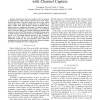Free Online Productivity Tools
i2Speak
i2Symbol
i2OCR
iTex2Img
iWeb2Print
iWeb2Shot
i2Type
iPdf2Split
iPdf2Merge
i2Bopomofo
i2Arabic
i2Style
i2Image
i2PDF
iLatex2Rtf
Sci2ools
177
click to vote
GLOBECOM
2008
IEEE
2008
IEEE
Cooperative and Non-Cooperative Aloha Games with Channel Capture
—Game theory has been a useful tool for the analysis of random-access based wireless networks due to their decentralized operations. This paper studies one of the most widely used random access schemes, slotted Aloha, by modeling it as games. Unlike other game theoretic analyses of slotted Aloha, channel capture is assumed in this paper. Two different types of Aloha games, cooperative and non-cooperative, are considered since scenarios for behaviors of mobile terminals in slotted Aloha systems can be twofold. With analysis, a threshold strategy, quite a simple strategy characterized only by the threshold value, is shown to be a potential optimal strategy for the cooperative game, and is also shown to be the unique Bayesian Nash equilibrium (BNE) for the non-cooperative game. Numerical examples provide the threshold values for the optimal strategies and BNEs with different system configurations.
Related Content
| Added | 29 May 2010 |
| Updated | 29 May 2010 |
| Type | Conference |
| Year | 2008 |
| Where | GLOBECOM |
| Authors | Younggeun Cho, Fouad A. Tobagi |
Comments (0)

